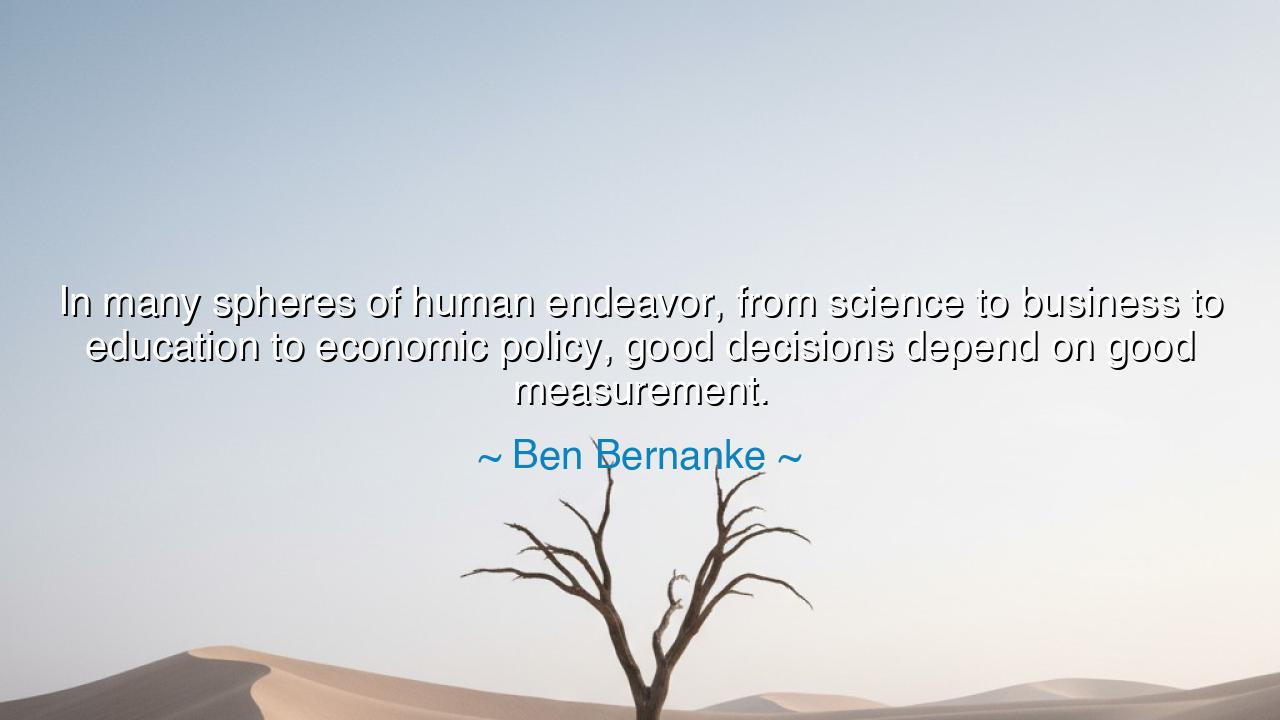
In many spheres of human endeavor, from science to business to
In many spheres of human endeavor, from science to business to education to economic policy, good decisions depend on good measurement.






The modern sage of economics, Ben Bernanke, a man who guided nations through storms of uncertainty, once declared: “In many spheres of human endeavor, from science to business to education to economic policy, good decisions depend on good measurement.” Though spoken in the language of a scholar, these words ring with the timeless wisdom of the ancients. For they speak to a truth that has guided humankind since the dawn of civilization: that without clarity, precision, and understanding, even the noblest intentions lead astray. Measurement—the art of knowing what truly is—has always been the foundation upon which wisdom and progress are built.
From the earliest days, when the builders of Egypt measured the earth to raise the pyramids, to the philosophers of Greece who measured the stars to understand the cosmos, humankind has sought truth through the discipline of observation. For measurement is not merely the counting of numbers; it is the practice of seeing rightly, of distinguishing illusion from reality. In science, this truth shines most clearly. The laws of motion, the orbit of planets, the pulse of the atom—all were unveiled not by guesswork, but by careful measurement. It is through this discipline that humanity rose from ignorance to understanding, from chaos to order.
Bernanke, who once stood at the helm of the Federal Reserve during the Great Recession, knew well the peril of acting without clarity. In times of fear and uncertainty, when economies trembled and lives hung in the balance, he understood that every decision—whether to lend, to cut, to rescue, or to restrain—must be guided by data, by evidence, by sound measurement. To misjudge the weight of a problem is to destroy balance; to ignore the signs of change is to invite collapse. Just as the physician must take the pulse before prescribing the cure, the policymaker must measure the health of the nation before shaping its destiny.
History bears witness to both the glory and ruin that flow from the mastery—or neglect—of measurement. In the 18th century, when sailors braved the open seas, thousands perished from scurvy, their bodies wasting from lack of knowledge. It was not courage that saved them, but careful observation. A British naval surgeon, James Lind, measured the effects of diet upon his patients and discovered that citrus fruits restored their strength. His measurement, humble yet precise, changed the fate of empires, for it gave sailors health, voyages success, and commerce life. Thus, a simple act of measuring became a pillar of survival and progress.
Yet Bernanke’s wisdom stretches beyond science or policy; it touches the moral realm. For in education, in business, in every walk of life, the principle remains: that good judgment flows from good understanding. A teacher who measures not only grades but growth will see the hidden spark in a struggling child. A leader who measures not only profit but purpose will build enterprises that endure beyond riches. Even the individual soul must learn to measure its own heart—to weigh its motives, its fears, its hopes—lest it live blindly, chasing illusions. Measurement, rightly understood, is the practice of truth. It demands humility, patience, and honesty—the willingness to see things as they are, not as we wish them to be.
But let us also heed the balance within Bernanke’s insight: measurement is the servant of wisdom, not its master. For numbers without meaning can deceive, and precision without purpose can destroy. A society obsessed with what can be counted may forget what truly counts—the laughter of a child, the dignity of a worker, the courage of compassion. Thus, the lesson of the economist becomes the lesson of the sage: measure, but never forget the soul behind the measure. Seek truth through clarity, but let that truth serve humanity, not enslave it.
The teaching, then, is clear for all who would walk the path of understanding: Measure before you act, think before you judge, and learn before you lead. Let your measurements be honest, your insights deep, and your heart awake to the greater purpose that numbers alone cannot capture. Whether you are a scientist charting the stars, a teacher guiding minds, or a leader shaping nations, remember this eternal law—that good decisions depend on good measurement, and that to measure well is to honor both truth and life itself.
So let Bernanke’s words be written not only upon the ledgers of economists, but upon the hearts of all who seek wisdom. For the one who measures wisely lives wisely; the one who knows truly acts justly; and the one who unites reason with understanding walks the path of light amidst the shifting shadows of the world.






AAdministratorAdministrator
Welcome, honored guests. Please leave a comment, we will respond soon